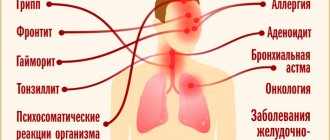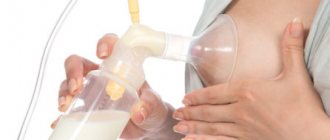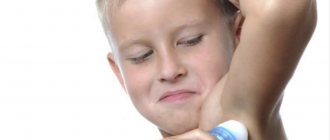Regurgitation
Sometimes a baby cries after formula or breastfeeding, and also spits up profusely (we recommend reading: a newborn cries while breastfeeding: reasons). Parents are frightened by such a “milk fountain”, primarily because the child does not receive enough nutrition. It is worth noting here that regurgitation is functional in nature and can be a variant of the norm. If the baby is gaining weight, has clear skin, and has normal stools, regurgitation most likely does not harm him. The baby will grow up, take a vertical position, his gastrointestinal tract will work better and regurgitation will stop.
Why else does a baby spit up? This phenomenon may be the stomach’s response to overeating - it is difficult for the baby to stop at the moment of satiety. Another reason is improper functioning of the gastrointestinal tract, as well as a lack of enzymes. A gastroenterologist can determine the root of the problem and prescribe treatment based on stool tests (coprogram) and blood tests. In some cases, an ultrasound of the pancreas is required. If you are concerned about regurgitation, you should be very careful about introducing complementary foods - be sure to discuss it with your pediatrician.
How to help?
- If a child spits up due to overeating, you need to reduce the intervals between feedings. He will not have time to get very hungry and will eat less; his stomach will not get rid of the excess.
- It is important to monitor how the baby eats. The reason for regurgitation may be that he swallows air along with milk. If the mother is breastfeeding, it is necessary that not only the nipple, but also part of the areola gets into the baby’s mouth, and the baby’s lower lip is slightly turned outward.
- We must not forget to carry the baby upright after eating to give him the opportunity to burp air. It is allowed to stroke the baby on the back to help the air escape. Only after hearing the specific sound of a burp can you put the baby to bed. The same should be done if the baby receives complementary foods from a spoon.
The main causes of baby crying during feeding
In order to understand why exactly your baby cries when feeding, you need to know the reasons for this behavior, there may be several of them:
- His tummy hurts. Often newborns are capricious when eating due to the immaturity of the gastrointestinal tract. According to pediatricians, premature babies and boys most often suffer from colic, but both girls and full-term babies can have tummy pain. Thus, the gastrointestinal tract still has difficulty coping with the digestion of food, which may cause pain while eating;
- Incorrect attachment to the breast. If you do not learn how to properly attach your baby to the breast, this leads to the fact that the baby swallows air along with the milk, which contributes to the appearance of colic;
- The child's mother ate a product that changed the taste of milk and made it unpleasant. So, the taste of milk can be affected by garlic or something spicy;
- Lack or excess of milk in the mother. In the first months of breastfeeding, the female body does not yet understand how much milk it needs to produce: if there is little or too much milk, the baby may cry during feeding.
These reasons are directly related to feeding and the discomfort brought to the baby while eating can be easily eliminated, but there are also other reasons why the baby cries during feeding.
Stomatitis or thrush
Sometimes the reason for a baby's crying after feeding lies in diseases of the oral cavity. Stomatitis occurs quite often in newborns. If you look into a sick child's mouth, you can see a white coating on the tongue and the inner surface of the cheeks. Inexperienced parents may not pay attention to this symptom, believing that the plaque is caused by milk residues. However, even after feeding, a healthy child’s mouth should be clean.
Also, stomatitis or thrush may appear in a baby after 6 months during the period of introducing complementary foods. The baby gains mobility and begins to put inappropriate objects in his mouth, which can easily carry fungus.
Home treatment
Thrush and stomatitis can be treated with a soda solution, wiping the areas covered with plaque with it. This method is quite aggressive and painful. You need to dissolve half a teaspoon of baking soda in a glass of boiled water, then soak a bandage or gauze in the solution and wipe the child’s mouth with it. This should be done after every feeding. In the same way, you can wipe your mouth with chamomile decoction.
However, stomatitis can be different, and the treatment for each type is different. A correct diagnosis is the key to recovery. If parents suspect a disease in their newborn, they should definitely show it to the pediatrician. During this period, you can try to wean the baby off the pacifier, but it is better to wait a bit with the introduction of complementary foods.
If there is a suspicion of stomatitis, it is better to show the child to a doctor
Lactase deficiency
The cause of crying may be a serious illness - lactase deficiency. The enzyme that breaks down lactose (milk sugar) must be generated in sufficient quantities by the small intestine. If this enzyme (lactase) is deficient or absent, breast milk or formula containing lactose will not be digested by the baby, but will only cause digestive problems. Symptoms of lactase deficiency other than crying are:
- Stool upset - it can happen up to 10 times a day, have a foamy texture and a sour smell (we recommend reading: foamy stool in a breastfed newborn). At the same time, irregular stool, as well as its complete absence without stimulation, can indicate lactase deficiency.
- Bloating.
- The child is underweight.
What makes a baby cry after formula feeding?
Crying is the only way a baby communicates with the outside world. Therefore, it is very important to correctly understand what a baby’s cry signals at one time or another.
- Physical inconveniences , which are caused by uncomfortable temperature (overheating, hypothermia), bright light, sharp and loud sounds, and a dirty diaper.
- Physiological causes - thrush, otitis media, colic, etc.
- Psychological factors - insufficient attention of the mother, the need for longer and closer contact, etc.
Crying from colic
This is the most common cause of crying in children in the first months of life. Colic occurs when gas accumulates in the intestines, causing pain and discomfort. Symptoms of colic appear between birth and 6 weeks of life and peak when the baby is 2 months old.
In most cases, colic goes away on its own when the baby reaches 3 months, although in 10% of infants, painful manifestations can continue until 5 months of age.
From the accumulation of air in the stomach
If the baby swallows air while feeding formula from a bottle, he will cry after eating. Crying in this case is caused by severe discomfort due to the fact that an air bubble has formed in the stomach.
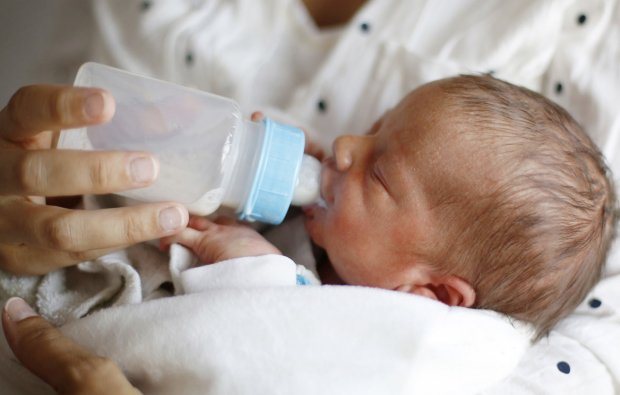
The baby may cry after feeding when the bottle with the formula is already empty - he probably did not receive the full amount of food. In this case, the baby will reach for the bottle for more.
From overeating
There is a misconception that a child will not eat more food than he needs. However, the problem of overeating is more often faced by those mothers whose children are bottle-fed. As a result of excessive consumption of formula, a feeling of heaviness in the stomach occurs, due to which the child becomes restless and whiny.
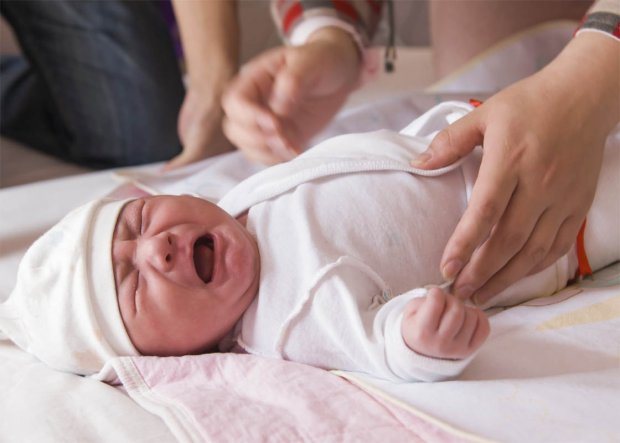
Pediatricians recommend strictly following nutritional standards according to the baby’s age and adhering to a feeding regimen.
Because of illness
If a child has otitis media (inflammation of the middle ear) or thrush in the mouth, then pain and discomfort will worsen after feeding, manifesting itself in screaming, especially after the mother tries to touch the ear.
Why does a baby cry after breastfeeding?
When should you express milk?
Don't cry , don't cry , I 'll die .
Don't cry , dear , I'll kill another one .
Don't cry , don't scream , I'll give you three .
Every mother worries and worries when her child cries. And there is no such mother who, at least once, would not cry with her baby.
Little children are crying! You can't argue with this fact. But here's how babies cry, when, how often, and most importantly, why - let's figure it out.
A child who is not bothered by anything behaves calmly. And when we cry, the little man declares his needs. This is the only way the baby can tell his mother that something is bothering him. This is an innate mechanism for communicating with the world.
Stay calm! Try to find the cause of the crying and eliminate it. Understanding why a child is crying can be difficult at first, and even more difficult in a state of own anxiety and uncertainty.
Children often cry in response to their mother’s anxious state. It is important to follow the infant's nonverbal cues. Once you learn to recognize why your baby is crying, it will become much easier for you.
Many mothers consider hunger to be the most common reason for a baby crying after feeding. Indeed, this version should be considered one of the first. It is also the easiest to check.
First, evaluate how long the toddler suckled at the breast. Newborns suckle for an average of 30-40 minutes. Children over 3 months old get full within 10-15 minutes of good, effective sucking.
If the baby gains weight well, and according to WHO standards, this is more than 500 grams per month during the first 3-4 months of life, or 125 grams per week, and the number of urinations per day is at least 12 times, then he has enough nutrition.
If the weight gain is small, then you need to take measures to increase lactation: offer the baby the breast more often, monitor proper attachment, express milk and supplement the baby with it. Read recommendations for increasing your milk supply.
Assess the situation. If weight loss is not critical, you should not immediately introduce the mixture. Yes, many children, having received 100-120 ml of the mixture, calm down, stop crying and fall asleep for several hours.
But not because they finally fell asleep full and satisfied. It’s simply because the baby’s stomach is filled with food that is difficult to digest, and the body spends all its energy on processing the mixture.
It will digest it and may cry again, if the reason for the crying is not hunger.
Cold-hot
If a child is cold, he cries, shrinks into a ball and requires the breast for heating - because during sucking, energy is expended and heat is released, which warms him.
It happens that the baby is warm at the chest, he has eaten and let go of the chest. Mommy puts him in his crib, and he immediately wakes up, worries about the loss of heat and cries.
In this case, try feeding your baby swaddled so that his body retains heat longer.
At the end of feeding, while continuing to hold the baby in your arms, cover him with a blanket or warm diaper and transfer him to the crib.
Watch the color of the skin; normally it is pale pink.
Red skin indicates that the child is hot. Breastfeeding itself makes the toddler sweat, and if he is wearing too many clothes, the room is hot - crying at the chest is inevitable.
The baby is hot, and your body makes it even hotter, but at the same time, he wants to quench his thirst by sucking milk...
Undress the poor thing immediately! And watch the temperature in the room, it should not exceed 20 degrees.
Pain
Many children experience tummy pain and hiccups after feeding due to enzymatic immaturity of the digestive system. Intestinal colic cannot be confused with anything. After feeding, the baby screams, kicks his legs, presses them to his tummy, his face turns red, the crying becomes simply uncontrollable, it seems that he will never stop.
Constant hiccups in newborns after feeding can also unsettle the balance, what should you do? Here you need to show maximum patience, calmness and ingenuity. Try everything until you find a way to stop the crying: tummy massage, warm diaper on the tummy, rocking on a fitball, white noise, lullabies, different ways of carrying the baby (tummy down on your arm bent at the elbow).
Something will definitely bring relief to the baby.
When feeding by the hour, supplementing with water, or improper breastfeeding, the baby may be bothered by regurgitation , flatulence , heartburn, and hiccups . In this case, contact a lactation consultant to effectively organize breastfeeding
But, unfortunately, it’s not just the baby’s tummy that can hurt.
With otitis - a baby reaches for the breast, maybe even sucks, but lets go - cries, and looks for the breast again.
With candidiasis of the oral mucosa, the baby cries at the beginning of feeding, then still latches and sucks, and cries again at the end of feeding. As a rule, a whitish coating can be seen on the oral mucosa and tongue.
If you suspect otitis and candidiasis, consult a doctor.
Discomfort
If you have ruled out the above reasons for crying, but the baby continues to cry, perhaps something is causing discomfort:
- diaper rash
- seam on clothes
- uncomfortable position when feeding
- wet/dirty diaper
- bright light
- noise
- the baby is overtired
Eliminating these causes is not difficult: wash the baby, change the diaper, straighten the seams on the clothes and the folds in the diaper, dim the lights, reduce unnecessary sounds, rock them, and attach them correctly to the chest.
Loneliness and lack of physical contact with mom
Above, we indicated that the need to satisfy hunger is one of the first reasons for a baby’s crying. However, the need for physical contact with mother in the first months of life often becomes the real reason for the toddler’s crying.
The baby does not yet recognize himself as separate from his mother. In his mind, his mother is a part of himself. Yes, I satisfied the sucking reflex and got full, but for some reason I lost part of myself...
And the poor baby cries, not understanding where the dear and necessary part is, and when it will unite with him again (read, take him in his arms).
At this time, “well-wishers” tell the mother: “You’re crying, you haven’t eaten enough, you don’t have enough milk, you need to give formula.” And breastfeeding fades away. And most importantly, the child, having not received the right actions from his mother, over time simply stops turning to her (read, stops crying). The saddest scenario...
Be a confident mother, listen to your child and respond correctly to crying.
Statistics say that children who are carried in a sling cry less.
And psychology and the history of mankind prove that a child under one year old does not manipulate his crying, but shouts about his needs. It is impossible to spoil him by satisfying them.
Important! If:
- all measures taken to calm the baby’s crying do not help
- The baby shows signs of illness on his face
- the baby cries for more than 3 hours without a break and refuses to breastfeed
You need to seek help from a doctor.
What were the reasons for your child’s crying? How quickly did you learn to identify them?
Hair loss in a nursing mother
Source: https://viline.tv/deti/article/rebenok-placet-posle-kormlenia-pocemu
How to determine what is causing crying
In the first months after birth, the child adapts to life outside the mother’s womb - he gets used to the sleep and wakefulness patterns, feeding, digestion, etc. This is new and unusual for a newborn, so he constantly cries.
In the first weeks after childbirth, a woman also gets used to her new state of motherhood, observes the baby and gradually begins to understand the reasons for the child’s screaming and crying. As mentioned above, this may be a condition not related to illness (discomfort, temperature change, hunger, etc.).

If you suspect an earache, headache or other painful conditions that cause the baby to cry, you should immediately consult a doctor and not try to treat the baby yourself.
For example, in case of hunger, the baby smacks his mouth, as if searching for a source of food. When hypothermia occurs, the child shrinks into a ball, hiding his limbs under the body, and in case of heat, he becomes sweaty and red and tries to get rid of clothes.
The pain experienced by a newborn can be judged by an even, unabating cry with screams - it signals colic, teething, skin irritation, headaches and other pains.
It is necessary to constantly monitor the baby’s behavior, gradually correlating the intensity and tone of crying with the general physical condition of the child at the time of his restlessness.
Need a doctor
Refusal to eat can be quite an alarming sign. But don't panic. You should seek the help of a doctor if:
- A breastfed baby (eats only breast milk!) has not pooped for more than three days.
- The baby doesn't sleep well.
- High body temperature in a child.
- The baby is lethargic and pale.
- The infant experiences excessive regurgitation and vomiting.
- The baby screams for a long time and does not calm down.
For a child who eats formula or complementary foods, constipation is considered the absence of stool for 24 hours.
Even 1-2 of the symptoms listed above are a reason to at least call your doctor, and quite possibly call an ambulance.
The first weeks after childbirth, a young mother and a newborn get used to each other. A woman doesn’t understand much about her baby’s behavior, but almost always the baby shows dissatisfaction and discomfort by crying or screaming. If a child begins to be capricious during feeding, then this is a reason to think about it. Why does a newborn cry while feeding?
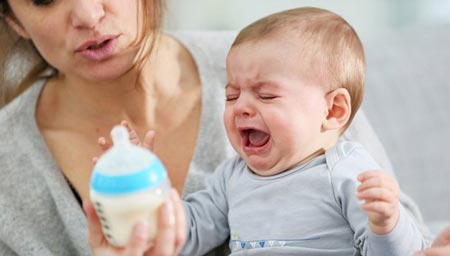
How to calm a child correctly
Whatever the reason for crying, you must try to calm the baby as quickly as possible.
To do this, you can use various methods:
- In case of colic, perform a light massage of the abdomen, and then apply a diaper heated with an iron, folded in several layers.
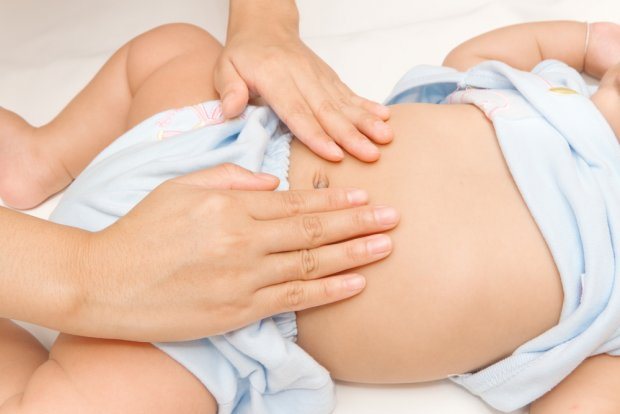
- For some time after feeding, carry the newborn in an upright position, in a column. This will allow the air that was absorbed by the baby while sucking the bottle to escape.
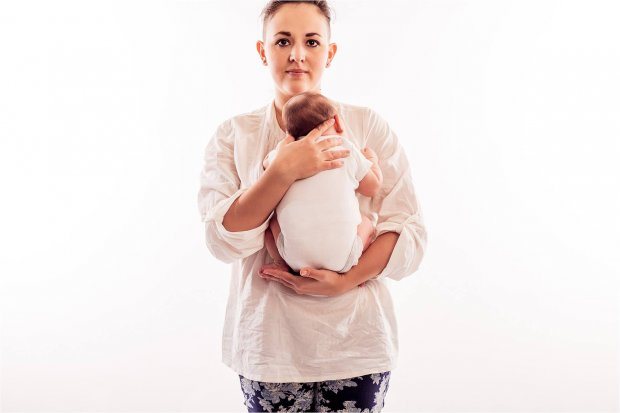
- If the air bubble presses on the walls of the stomach, the child should be placed on the adult's shoulder so that the baby's arms and head are behind the shoulder. Within a short period of time, excess air will go away and the pain will stop.

- If the baby is crying “hungry”, you need to supplement the baby with formula.
Prevention of colic
As already mentioned, in order to relieve a baby from colic, you need to not put him in the crib immediately after feeding, but hold him in the “soldier” position for some time.
Other preventive measures against colic include the following:
- carefully choose infant formula;
- observe diet and hygiene when feeding the baby;
- make sure that no air gets into the bottle with the formula;
- carefully approach the mother’s nutrition (in the case of breastfeeding);
- from time to time, lay the baby on his stomach for 10 minutes and stroke his back;
- on the recommendation of a pediatrician, you can use pharmaceutical herbal preparations based on anise, dill, and fennel.
A child’s crying is a natural mechanism that allows a baby to “declare” its problems to adults. Therefore, it is very important to be able to recognize his needs in the intonations of a child’s cry and promptly eliminate possible sources of crying.
Possible reasons why a newborn cries after formula feeding
All reasons for children crying after feeding can be divided into three groups:
- Physical discomfort, such as dirty diapers, bright lighting, overheating or hypothermia.
- Physiological discomfort, this group includes colic, otitis media, thrush and others.
- Psychological discomfort is a lack of mother’s attention, the need for closer contact with her.
Let's look at all the reasons in more detail
1. The most common cause of crying in children after feeding in the first months is colic , namely the accumulation of gases. In addition to screaming, the baby begins to tighten his legs and close his eyes.
Colic occurs in most children between 0 and 3 months of age. Parents will have to be patient, as there is no universal cure for them. The doctor may prescribe medications; it is also recommended to massage and apply a warm diaper to the tummy.
2. It is important to pay attention to exactly how the baby eats. If he swallows air , most likely he will also cry after eating, because then an air bubble will form in the stomach and cause serious discomfort to the baby.

3. Another common reason is too much appetite, that is, the baby swallows a lot of milk, which causes a gag reflex. The child gets scared and starts crying. In such a situation, you need to calm the baby down and only then continue feeding.
4. When feeding with formula, there are often cases when mothers overfeed their children. When overeating, stomach pain occurs, and the baby tries to communicate it to his parents by crying. Of course, all children are different, but in general, the recommendations for the amount of formula for babies of the same age are the same. Check with your pediatrician to determine if your child is overeating.
5. The reason to see a doctor is when the baby is crying and trying to scratch or touch his ear. Most likely, eating food provokes an exacerbation of pain in a child due to otitis media - inflammation of the ear. In such a situation, you cannot do without the help of an otolaryngologist.
6. If you notice a white coating in your baby’s mouth, this is thrush. After eating, it worsens and causes discomfort in the child. A doctor will help you get rid of it, but in the meantime you can spoon feed your baby.

If there is a large hole in the nipple, replace it with another with a smaller hole so that the baby does not choke.
Serious reasons to contact a specialist include the following reasons for crying:
- diseases of the digestive tract,
- intestinal infections (accompanied by loose stools, fever, vomiting),
- migraine with increased intracranial pressure (with migraine, the child often behaves in the same way as with colic).
Unfortunately, it will be difficult for parents to recognize these diseases without the help of a doctor, so take the time to take the necessary tests at the clinic and consult with specialized specialists.

How to help your baby - useful tips
- Before and after feeding, place the baby on his stomach for a few minutes, and after feeding, hold him in a column with his stomach facing you so that he burps up excess air.
- Check with your doctor to see if the formula can be changed. Often this helps solve the problem.
- Use high-quality formulas that have not expired, as well as bottles and nipples from trusted manufacturers.
Remember that all difficulties are temporary, and an attentive attitude towards your baby will definitely help to overcome them.
Sources:
https://vseprorebenka.ru/pitanie/kormlenie/rebenok-plachet-posle-kormleniya.html https://agu.life/bok/2185-pochemu-novorozhdennyy-plachet-posle-kormleniya-smesyu.html https:// osmesi.ru/%D1%80%D0%B5%D0%B1%D0%B5%D0%BD%D0%BE%D0%BA-%D0%BF%D0%BB%D0%B0%D1%87% D0%B5%D1%82-%D0%BF%D0%BE%D1%81%D0%BB%D0%B5-%D0%BA%D0%BE%D1%80%D0%BC%D0%BB% D0%B5%D0%BD%D0%B8%D1%8F-%D1%81%D0%BC%D0%B5%D1%81%D1%8C/
Why does a baby cry while breastfeeding?
Many young mothers are faced with the fact that the baby cries during feeding or refuses to eat at all. There may be several reasons: the baby’s well-being, the peculiarities of the anatomical structure of the mother’s breast, external factors, etc. As a rule, it is easy to establish the process if you make an effort and be patient.
If a newborn screams during feeding, is nervous, freaks out, worries and even squirms when he is put to the breast or given a bottle, this not only prevents him from feeding himself, but also makes the mother worry that a lack of milk may cause.
To establish the process of breastfeeding and bottle feeding, it is necessary to carefully observe the child and rule out the reasons for his restless behavior. Determine when your baby starts to get nervous:
- before feeding;
- when first putting on the breast or taking a bottle;
- in the process of sucking milk or formula;
- before finishing feeding.
Reasons for baby crying while breastfeeding
The reasons why a baby cries when breastfeeding include:
- unpleasant taste of mother's milk;
- difficulty in obtaining milk during sucking;
- too strong flow of milk during lactation;
- insufficient milk supply during breastfeeding;
- improper attachment to the breast;
- the child's haste when sucking;
- flat or depressed shape of the nipple of a nursing mother.
First of all, a woman during lactation must adhere to a special menu that will make breast milk rich in vitamins and microelements. If you eat something spicy, too spicy, or smoked with hot water, be prepared for the fact that this will affect the taste of the milk. The baby may not like it, and the baby will be nervous during feeding and refuse the breast altogether, which means lactation will stop.
To make sucking easier and normalize the flow of breast milk, you can express it several times by hand or using a breast pump. You should also avoid wearing a smaller bra, which will put pressure on the mammary glands and interfere with breastfeeding.
If the milk flows too strongly, the mother can also use a breast pump for partial expression or a special technique for feeding the baby in an upright position using a sling.
Sometimes the baby is capricious at the breast when he eats, tries to suck, but gets restless, squirms and cries. This may indicate that he does not have enough milk. Then measures should be taken to increase breast milk production by drawing up a new full menu and including special teas in it. It may be necessary to supplement your breastfeeding baby with formula.
There are times when a baby on breastfeeding is so hungry that he tries to suck very quickly and at the same time constantly swallows air. As a result, colic appears and the baby cries at the breast. This can be easily determined by the fact that the baby begins to squirm and tries to pull his legs towards his stomach. This is accompanied by intense crying. The mother should move the baby to an upright position and wait until the excess air comes out with a burp. After this, you can continue feeding.
Often the reason why a baby cries is the anatomical features of the mother's breast. The problem of latching onto breasts with flat or depressed nipples can be solved with the help of silicone pads, which are sold at the pharmacy.
Don’t forget that you can contact breastfeeding specialists who will guide you throughout the entire lactation period and help you in difficult situations.
Reasons why a baby cries when bottle-fed
It's not just mothers who breastfeed who experience feeding problems. This also applies to those who prefer or are forced to give their baby formula from a bottle. The reasons for the child’s anxiety in this case are:
- mixture is too hot or cold;
- incorrect position of the child;
- taste of the mixture;
- unsuitable pacifier.
The preparation of the mixture should be carried out according to known rules: only sterilized containers are used, the temperature of the milk mixture itself should be no lower than 36 and no higher than 37 ° C. For sterilization, special devices for microwave ovens, called sterilizers, or ordinary boiling are used. The temperature is checked using a special thermometer or by dripping the mixture onto the inside of the wrist.
Try to make the baby feel comfortable during the process. Sometimes the answer to the question why a baby screams during feeding lies precisely in an uncomfortable position. The bottle-feeder should try several positions for the baby - on the side, on the back, reclining.
To bottle feed your baby, you need to choose not only a formula that he will willingly eat, but also the right nipple. Among the huge assortment, through trial and error, choose the one that will make feeding convenient and enjoyable. Sometimes a child cries while feeding formula because he cannot get enough of it through the holes in the nipple, and this is difficult for him. Watch him, change the pacifier to one that has more holes.
Reasons for a baby's crying, regardless of feeding method
If you have done everything to make feeding comfortable and correct, and the baby is crying, you should pay attention to some reasons that occur with both breastfeeding and artificial feeding:
- wet diaper;
- cutting teeth;
- headache or ear pain;
- runny nose;
- irritating external factors;
- deviations in the anatomical structure.
If your baby is fussy at the breast, continues to fuss, cry and squirm in your arms, or becomes nervous during feeding, check the diaper. The feeling of wet buttocks is a common reason that prevents a baby from eating calmly.
When your baby is breastfeeding restlessly, he may be teething. Use special gels - they will alleviate the baby’s condition.
Interferes with the normal feeding process and runny nose. When an infant cannot breathe through his nose, he begins to freak out because he cannot cope with sucking. Rinse the baby's nose with saline solution, use an aspirator, and instill vasoconstrictor drops for children over 0 years old.
Loud noises, movements of strangers nearby, and new bright toys can make you nervous during feeding and make you worry. Children at the 5th month of life are already interested in everything that surrounds them, so the nursing mother should take care of a calm environment.
Headache and anatomical abnormalities can cause the baby to be nervous when feeding. As a rule, such disorders are identified during periodic visits to the pediatrician. In the first year of life they are carried out monthly. If your baby does not have a diagnosis, and the neurologist claims that his health is normal, then when answering the question of why the baby cries during feeding, these reasons can be excluded. The only thing that can be alarming is a runny nose, which provokes ear pain.
Parents should always be attentive to the fact that the child behaves restlessly during feeding. Monitoring changes in his behavior can help your pediatrician address the crying problem.
kidfeed.ru
